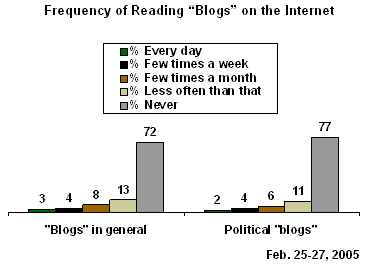Gallup has released a new poll indicating
Very few Americans read them with any frequency
Three-quarters of the U.S. public uses the Internet at work, school, or home, but only one in four Americans are either very familiar or somewhat familiar with blogs (the shortened form of the original "Web logs"). More than half, 56%, have no knowledge of them. Even among Internet users, only 32% are very or somewhat familiar with blogs.

Mystery Pollster said No, the collective reach of blogs is nowhere near that of television or print media, but focusing on the relatively small percentages misses the rapidly growing influence of the blog readership in absolute terms. The 12% that say they read political blogs at least a few times a month amount to roughly 26 million Americans. That may not make blogs a "dominant" news source, but one American in ten ads up to a lot of influence.
Mickey Kaus with Slate responds that Mystery Pollster notes that if 12% of Americans really read political blogs, as Gallup reports, that's not a small number. It's an astonishingly large number. (I would have guessed 3%.)
Cori Dauber notes if we were only to invert Gallup's phrasing, a quite simple rhetorical move, we get a figure of one quarter of all Americans already familiar to some degree with blogs, one third of all Internet users. Pretty good for a medium in its infancy, which Gallup admits is already influencing the "insiders."
Tom Biro said Obviously I'm biased as a blogger, but I have to say that my on-top-of-it-ness has significantly increased since I began reading and writing weblogs, and the large number of people using instant messaging devices and software has changed the way we learn about what's going on around us. So while Americans may not be directly aware of what blogs are, that doesn't mean they don't know people who are bloggers. Those bloggers could be, in some circles, viewed as influencers (or "sneezers" if you like Seth Godin), spewing forth the news and info that they learn on a daily (hourly?) basis to their circle of contacts. I'd be interested to see some measurement of this "speed" that information is now being disseminated, as compared to the same type of thing two or three years ago.
Deacon notes only about 6 percent read such blogs at least a few times a week. Why is this good news? Because it shows how much room for growth political blogs have. In this regard, blog readership is significantly higher among those in the 18-29 age group. This group made up 17 percent of the sample but 25 percent of blog readers.
Andrew Sullivan notes Two points from me: I'm struck by the youth of blog readers, their relative influence and wealth, and, again, the overwhelmingly male cast of the readership. Susan Estrich can't ascribe that to Mike Kinsley's bias. All in all: skewing young, educated, wealthy, politically balanced (39 percent Dems, 35 percent Republicans or Libertarians, 19 percent Independents), and influential. An advertizer's dream.
As Terry Heaton notes the study's useful as a snapshot, but it'll be more useful if it's repeated next year. The trendline is what's important.
On a related point Kevin Drum references a very interesting study by Lada Adamic and Natalie Glance about blog behavior available in a PDF file and shows this cool blogo-diagram

- The conservative blogosphere has a generally denser web of relationships than the liberal blogosphere.
- However, it also includes the least connected major blogs. In the bottom diagram, the only large blogs without a single connection are both on the right: Andrew Sullivan and RealClear Politics.
- Generally speaking, there aren't very many ongoing relationships between right and left. You only need five links to get a connection in the middle diagram, but even so there are only three connections between right and left: Sullivan-Marshall, Sullivan-Kos, and Volokh-Crooked Timber.
I highly recommend study of both the PDF file and Kevin's analysis. You may also want to study the results from the Blogads Reader Survey
If Gallup (or anyone else) had done a poll shortly after Johannes Gutenberg came out with the Printing Press would it have shown that more people got their news from newspapers or the Town Crier? And what would the results be today?




No comments:
Post a Comment